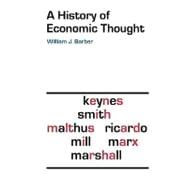
Note: Supplemental materials are not guaranteed with Rental or Used book purchases.
Purchase Benefits
What is included with this book?
| Acknowledgments | |
| Prefatory Note | |
| Prologue | |
| Classical Economics | |
| Introduction | |
| Adam Smith and the Framework of Classical Analysis | |
| Elaborations and Cleavages within the Classical System: Thomas Robert Malthus | |
| David Ricardo and the Formalization of Classical Analysis | |
| The Revisionism of John Stuart Mill | |
| Postscript to Classical Economics | |
| Marxian Economics | |
| Introduction | |
| Karl Marx and the Economics of Das Kapital | |
| Postscript to Marxian Economics | |
| Neo-Classical Economics | |
| Introduction | |
| Alfred Marshall and the Framework of Neo-Classical Economics | |
| Pre-1914 Variations on Neo-Classical Themes | |
| Postscript to Neo-Classical Economics | |
| Keynesian Economics | |
| Introduction | |
| The Economics of Keynes's General Theory | |
| Postscript to Keynesian Economics | |
| Epilogue | |
| Index of Proper Names | |
| Index of Concepts and Terms | |
| Table of Contents provided by Publisher. All Rights Reserved. |
The New copy of this book will include any supplemental materials advertised. Please check the title of the book to determine if it should include any access cards, study guides, lab manuals, CDs, etc.
The Used, Rental and eBook copies of this book are not guaranteed to include any supplemental materials. Typically, only the book itself is included. This is true even if the title states it includes any access cards, study guides, lab manuals, CDs, etc.